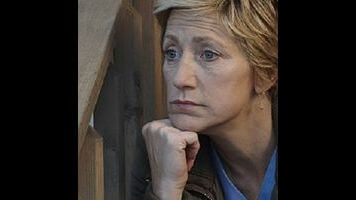Nurse Jackie: “Disneyland Sucks”

Now that Jackie is in rehab, this series may yet arrive at an inspiring message about how facing adult responsibilities in an adult way is the secret to a good life, but for now, the message seems to be that “accountability” is a bitch. It goes hand in hand with another message, which is that even though a person’s best friends (or the people who’ve been watching that person on a TV series) may think that the forces of karma might have it in for her, they have no idea.
Tonight’s episode manages to keep the workplace drama at the hospital unfolding (with Bobby Cannavale settling in as the downsizing, bottom-line-focused Dr. Cruz, the human face of the New Economy) while settling Edie Falco into her new milieu and the ensemble that comes with it. The great, perennially under-appreciated Margaret Colin is there, speaking in a Southern accent thick enough to bludgeon Rick Perry, and delivering a monologue about how she knew that her habit was getting out of hand when, after a night spent self-medicating in front of QVC, she found herself with “$5,000 worth of little, tiny clown statues made of Italian porcelain sitting in my garage.” The possibly even greater Mary Louise Wilson is the raspy, hatchet-faced Doris, Jackie’s roommate, whose favorite part of the therapeutic process involves writing letters that begin, “Dear Alexis, fuck you… ”
Jackie, naturally, finds it easy to distance herself from these freaks by feeling superior to them. Colin’s character has a blandly sweet air that would tempt the sour New Yorker inside anyone to imagine a whole soft, pampered back-story for her, while Doris is both unpleasant company and totally nuts. Jackie, on the other hand, knows who she is, and what she does. She’s a nurse: It says so right there in the title. Laura Silverman’s chief counselor asks Jackie if being a drug addict makes her “a better nurse.” Jackie doesn’t come right out and say that there are people who are alive now who’d be dead if she weren’t numbed out most of the time, but in a plainspoken, down-to-earth way, she’s not above indulging this line of thought. Being an addict, she says, makes her a better nurse in the sense that “I can work more hours, put some food on the table. I cannot lose my shit with the patients.” In a nutshell, she seems to say, she does need to abuse drugs to do her job to the best of her ability. Wayne (Carmelo Anthony), a professional baseball player, flashes a broad smile and tells her that he totally knows where she’s coming from.
The one member of the group who moves Jackie to something like candor is Charlie, a green-haired 17-year-old who’s doing rehab for the fourth time. (He’s played by Jake Cannavale, the son of Bobby Cannavale and Jenny Lumet.) “I love my drugs,” he says by way of explaining what he’s doing there, “and they love me. They’re gonna bury me, and guess what? I’m okay with it.” This glib pseudo-honesty gets Jackie right where she lives. In the group discussion, she had answered a question about how she first got hooked by claiming to have hurt her back at work when she “slipped in a puddle of urine and blew out a disc.” Alone with Charlie, she finally goes where the show has only flirted with going before.
It turns out that the puddle of urine in that story was a stand-in for her eldest daughter. Jackie got pregnant, had Grace, took her home from the hospital, and “she starts screaming, and she does not stop for two years. I’m holding her, I’m telling her everything’s gonna be all right, and then you start thinking, does she know something I don’t? She was just so, hurt, and by nothing. I stole a hundred tabs of Percocet and never looked back.” Jake is nothing if not supportive. He tells her that Grace is “your Ground Zero. And that’s okay.” Jackie hears the “Ground Zero” part.
Deeply shocked at having heard herself name her own daughter as the reason for her problems, Jackie concocts a double-barrelled masterpiece of junkie logic by convincing herself that Grace desperately needs to see her, and selling out her one-person in-house support system in order to pull it off. First, she snitches on Charlie, who has a secret cell phone, so that she can steal a moment to call O’Hara and beg her to bring Grace to the clinic. The actual visit, with a frightened, confused Grace being hustled in and out just so that Jackie can spend enough time with her to relieve her guilty feelings and lie to her about her reasons for being on the premises—she tells her that she’s working there—has the makings of a classic moment in cringe comedy, but the show has too much, well, grace to play it for laughs. So it’s just cringe-inducing, in a good way.
When Silverman’s character calls Jackie on the carpet for this little piece of theater, Jackie, taking on the self-protective coloration of a long-suffering mother, bleats that her daughter “needed to see me.” It would be cruel enough to simply state the obvious, which is that Jackie has risked making her troubled daughter even more so because of her need to see Grace, but Silverman really brings the hammer down: Actually, she says, from the looks of things, it seems that “she needed to not see you.” Threatened with dismissal from the program, Jackie redeems herself by getting out of bed in the middle of the night and alerting the staff when Doris suffers a stroke. (“You saved a life,” the chief counselor tells her. “Happy now?”) She’s reaffirmed her identity by showing herself, even when off the clock, to be a great nurse. Whether she’s anything else that any sane person would want to hang out with, much less be, remains to be seen.